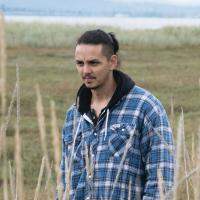Robert Clifford
Assistant Professor
Co-Academic Director, Indigenous Legal Studies
B.A., JD, LL.M. (Victoria), PhD (Osgoode)
- Email: clifford@allard.ubc.ca
Profile
Robert is WSÁNEĆ and a member of the Tsawout First Nation, his home community; he carries the name YELKATŦE, which was passed to him by his late grandfather, Earl Claxton Sr. His PhD research uses community participation methodologies to explore the ways WSÁNEĆ laws are generated by and reflect the values, philosophies, lands, and worldviews of the WSÁNEĆ people. The research is equally important in terms of practical application for the WSÁNEĆ community and as a contribution to theoretical understandings of what it means to responsibly engage WSÁNEĆ law, and Indigenous law more generally, within complex contemporary power structures and dynamics.
Robert is actively involved in the academic and broader community. He has presented his work widely across academic and professional settings, speaking at community events as well. His publications cover a range of aspects relating to Indigenous law and Indigenous legal theory, including on legal pluralism, Indigenous language revitalization, and Indigenous spirituality. He has also taught in the JD program at the University of Victoria, most recently a field course in WSÁNEĆ law. At Allard Law, he will be teaching Law 358: Topics in First Nations Law (Indigenous Law and Climate Change), Law 291: Aboriginal & Treaty Rights, as well as a semester long intensive land and community-based field course in W̱SÁNEĆ law.
Research and Publications
To learn more about my research, please visit my PURE Research profile. You can also access my works on the following sites:
Courses
379D.005 ĆELÁṈENEȽ: A Field Course in the Re-emergence of W̱ SÁNEĆ Law
This course applies to the Specialization in Aboriginal Law.
The Allard School of Law is offering ĆELÁṈENEȽ: A Field Course in the Re-emergence of W̱ SÁNEĆ Law during the Fall term of 2023 This course is offered in partnership with the W̱ SÁNEĆ Nation and the University of Victoria, Faculty of Law. ĆELÁṈEN means “ancestry or birthright” and ĆELÁṈENEȽ means “of the ancestor’s cultural ways” or “of the birthrights”. This intensive land-based course will be taught in the W̱ SÁNEĆ community on the Saanich Peninsula and will include a number of trips to local mountains, rivers, and a 3-night camping trip on the Gulf Islands. This course is focused on W̱ SÁNEĆ People’s own laws, and the ways in which those laws are generated and carried forward. Consideration will also be given to the colonial relationship and power structures between the W̱ SÁNEĆ and Canadian legal traditions, as well as the opportunities and barriers this creates for the revitalization of W̱ SÁNEĆ law. A principal purpose of the course will be to develop a collaborative community-based legal education model. During seven weeks of the course students will work under the supervision of W̱ SÁNEĆ community members in learning and applying W̱ SÁNEĆ law to community-based projects identified as important by the W̱ SÁNEĆ community. The first three to four weeks of the course involve an intensive land-based learning component where students will have 6 hours of contact per day, which will also include skills-based components in preparation for student community projects. Class contact hours over the next eight weeks will fluctuate while students are engaged as community-based learners and participants working in small groups of 2 or 3 directly with WSÁNEĆ elders and knowledge holders on identified projects. Students will be expected to treat this eight-week period as a full-time educational experience, devoting at least 30 hours a week to their community-based work and research. During this eight-week period, we will also meet as a group once per week to hear from guest speakers, to debrief as a group regarding the ongoing community projects, or to go on the occasional land-based outing. The last week of the class will once again involve a 6 contact-hours-a-day classroom component. Students will make presentations and engage in discussions with one another and select community members related to their eight-week placement experiences. We will open and close the course in a culturally appropriate way

Organization Affiliations
- Centre for Law and the Environment
Research Interests
- Aboriginal and Indigenous law